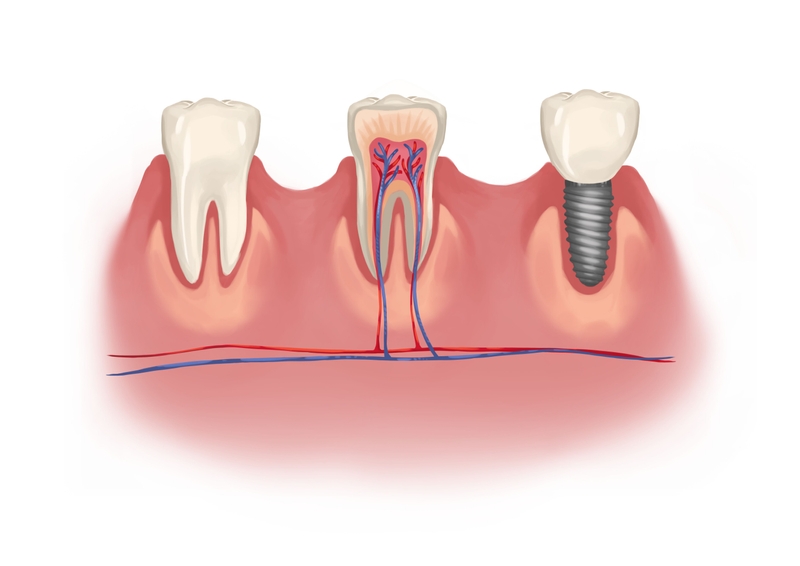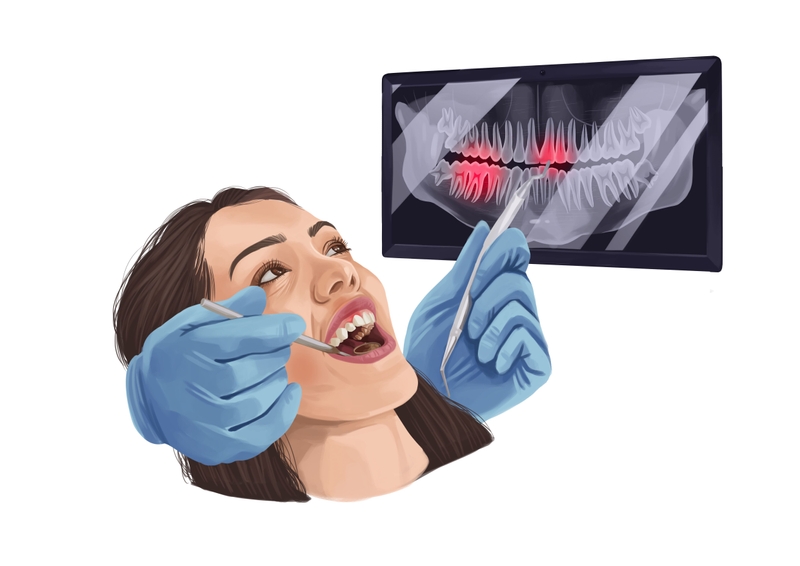- Gum disease, smoking, insufficient jawbone, autoimmune diseases, and medications can affect your dental implant. Complications can also occur if you have poor oral hygiene, do not follow post-operative instructions, or have an inexperienced surgeon.
- Dental implant complications include poor healing, infection, gum disease, micro-movements of the implant, nerve or tissue damage. Sinus problems and allergic reactions are also possible.
- Thorough preparation for the procedure and following post-operative instructions can help you avoid some of these problems.
Experience a smile makeover like never before. Use Authority Dental to book top-rated dental implant dentists. Over 1,500 locations available.
Are you concerned about possible complications with dental implants? Here's everything you need to know.
What causes dental implant problems?

Picture by Authority Dental under CC 2.0 license
Problems with dental implants can arise for a variety of reasons. Some can be avoided, while others occur spontaneously.
Causes of dental implant failure include:
bone loss (insufficient bone in the jaw),
medical conditions,
autoimmune diseases,
medications,
poor oral hygiene,
inexperienced surgeon,
not following post-operative instructions.
For emergency dental care related to your implant, visit a walk-in dentist near you immediately.
Potential dental implant complications
You should understand the potential implant complications before your surgery so you can help prevent them as much as possible. Any concerns you have should be discussed with your surgeon during your consultation.
Poor healing
Poor healing could be the result of someone who smokes or someone who has uncontrolled diabetes. In both cases, the body heals poorly, which can cause problems as the implant integrates with the bone.
A patient could also experience poor healing if they have uncontrolled periodontal disease, which is a disease of the gum tissue that destroys the surrounding bone.
Infection
While a dental implant cannot decay, it can get infected. Infection directly following dental implant surgery could be caused by a bacterial source or by factors contributing to poor healing. Smoking, periodontal disease, and uncontrolled diabetes can all cause an infection of the implant during the recovery process.
Gum disease
Without proper care and maintenance, dental implants can become infected and cause gum disease, just as your natural teeth can. An infected implant can cause peri-implantitis, a form of gum disease specific to dental implants.
Peri-implantitis can be caused by improper care, dental cement (leftover from implant crown cementation), poor implant angulation, placing an implant too close to another implant, bone loss, or poor bone quality. It can also occur as a result of systemic issues like uncontrolled diabetes and smoking.
The treatment for peri-implantitis depends on the severity of the infection, the type of implant used, its location, and the amount of bone loss around the implant. The implant surface must be cleaned to remove the source of infection. This can be done by performing a local debridement and surface decontamination.
If the infection is severe enough and includes bone loss, the implant may need to be removed.

Implant micro-movements
Implant micromovements are very slight (or micro) movements that prevent the implant from integrating with the surrounding bone. It will become loose if this occurs.
One cause of micromovements is loading the implant too quickly and placing a crown before osseointegration. That is why there are usually three or four months of healing time before placing the crown.
Lee provides more details: "This is where 'micro-movements' come in. If the implant wiggles even a tiny bit—maybe from chewing on it too soon or from poor healing—the bone cannot get a grip. It is like wiggling that post in the wet cement. The result is a failure to integrate, and the implant will never be stable."
"This is also why smoking is so devastating. Nicotine chokes off the blood supply, which is like starving the 'cement' of the water it needs to set properly," he warns.
Nerve or tissue damage
Occasionally, nerve or tissue damage can occur during dental implant surgery. While uncommon, it is more likely when placing an implant in the mandibular (lower) arch. If the implant is placed too deeply, it can penetrate the inferior alveolar nerve.
If this occurs, the patient may experience numbness, pain, or tingling. The sensation can be felt in the teeth, gums, chin, or lips. The nerve damage is permanent.
Sinus issues
While nerve damage is more common in the mandibular arch, sinus problems can occur when an implant is placed in the upper arch. The floor of the maxillary sinuses can often be close to the roots of your maxillary teeth. That is why some people experience tooth pain during a sinus infection.
A dental implant could perforate the sinus cavity during placement. If it happens during treatment, your dental surgeon will need to place a bone graft to close the exposure. If your surgeon thinks a sinus perforation is likely or definite, they will perform a sinus lift prior to placing the implant.
Allergic reaction
Dental implants are made of titanium. If you have an allergic reaction to titanium, you will experience hives or bumps in the oral cavity, dry gum tissue, tissue inflammation around the implant, and tissue swelling. The implant will have to be removed if you have a titanium allergy.
In some cases, the body will reject the implant for reasons other than allergies.
Can you prevent dental implants issues?

Picture by Authority Dental under CC 2.0 license
Deciding to get a dental implant is an important decision. As you may know by now, dental implants are also not the cheapest option you have to replace missing teeth - they are the best option, however. Since you are investing in your implant, you should also prepare and do everything you can to help ensure success.
Prepare for dental surgery
A variety of dental providers can place implants. You may want to research the dental specialists in your area before you decide which one you would like to perform your dental surgery. You should also have a routine checkup at your general dentist’s office to make sure your gum tissue is healthy. You may need other treatment before implant placement.
Consult with your medical doctor
You may also want to consult with your medical doctor, especially if you have untreated systemic conditions. As we mentioned earlier, uncontrolled diabetes can result in implant failure. If you have other autoimmune diseases, check with your medical doctor to see if there are any contraindications for dental implants.
Stop smoking
Now is a great time to stop smoking. This is another reason to consult with your medical doctor. They can provide you with the tools you need to quit smoking. You will increase the likelihood of your implant succeeding and improve other aspects of your health.
Avoid hard foods
Once the implant has been placed, avoid eating hard foods on that side of your mouth. Hard foods are another thing that can cause implant micro-movements, even before the implant crown is placed. Try eating on the other side of your mouth whenever possible.
Perform proper oral hygiene
You will need to keep the tissue healthy before and after implant placement. Perform proper home care as instructed by your dentist and have routine exams and cleanings. You can brush and floss your implant just like any other natural tooth.
FAQ
Are dental implant complications common?
Complications with dental implants are rare. Implants have a 98% success rate, and 97% of them last for a lifetime. Complications are more common in patients who are unhealthy.
What symptoms may indicate dental implant problems?
You can have a variety of symptoms that may indicate problems with your dental implant. The symptoms will vary with the cause. Most notably, you could experience difficulty or pain when chewing, gum and tissue inflammation, gum recession, swelling, or implant mobility.
Can your body reject a tooth implant years after placement?
It is rare for your body to reject an implant years after placement, but it can certainly happen. Also, if you have uncontrolled periodontal disease or peri-implantitis, it could cause the implant to become mobile and be lost for reasons other than being rejected by the body.
References
- Complications in implant dentistry
- Pre- and post-operative management of dental implant placement. Part 1: management of post-operative pain
- Management of peri-implantitis
- Methods to Improve Osseointegration of Dental Implants in Low Quality (Type-IV) Bone: An Overview
- Inferior Alveolar Nerve Injuries Following Implant Placement - Importance of Early Diagnosis and Treatment: a Systematic Review
Harry Lee, DMD
When patients ask about implant complications, they are usually worried about the surgery itself, but in my experience, the most significant risks often happen after they leave the chair. The most critical, make-or-break phase is the first few months, a process called 'osseointegration.' I always use an analogy: placing an implant is like setting a fence post in wet cement. For those first few months, that 'cement' (your bone) needs to be left completely undisturbed so it can harden and fuse to the implant.